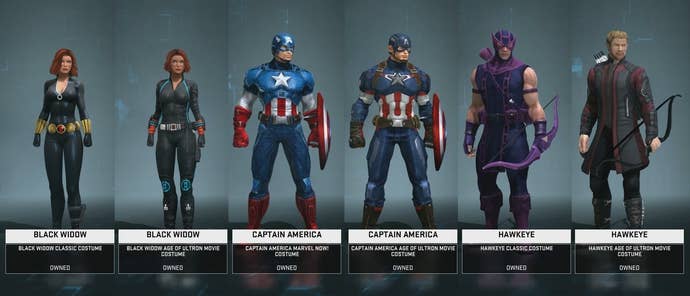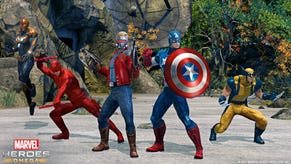When Games Like Marvel Heroes Shut Down, There Are Hardly Any Happy Endings
There's not a lot of closure when free-to-play games go away.
This article first appeared on USgamer, a partner publication of VG247. Some content, such as this article, has been migrated to VG247 for posterity after USgamer's closure - but it has not been edited or further vetted by the VG247 team.
It happened quickly. On November 15, Marvel announced that it was severing ties with Gazillion Entertainment, the developers behind the Action RPG Marvel Heroes. Then the company announced that servers for the game would be shutting down permanently at the end of the year before changing the closing date again to the end of November. And before anyone could process what was happening, Marvel Heroes was gone.
It's a distinctly modern problem in the short lifespan of video games. Normally when a studio shutters, you'll still have a playable game disc or cartridge to keep as a memento. But Marvel Heroes is an online-only, free-to-play game where you could spend anywhere from nothing to thousands of dollars for content. And as some players discovered in the sudden aftermath of Gazillion's closure, once the game is gone it's just gone. The scattered responses from players left in Marvel Heroes' wake paints a weird picture for how players are left behind when games shut down in the era of free-to-play and games as services.
One of the biggest surprises when speaking to the Marvel Heroes community is how often the idea of "getting your money's worth" came into play with a free-to-play game like Marvel Heroes. By and large, the PC players who've been playing the game for years and spent thousands of dollars over the total lifetime of the game aren't the ones calling for refunds. Instead it's the console players who've only had six months with the game that are pushing for refunds (a refund counter has been added to the Marvel Heroes subreddit). And even then, there are exceptions.
The most immediate controversy surrounding Marvel Heroes' closing revolves around the issue of refunds for console players. Earlier this year Gazillion released a console version of the game called Marvel Heroes Omega, which was also free-to-play but only lasted about six months. Comparatively, the PC version launched in June 2013. Although Gazillion shut down microtransactions as soon as it was announced that servers for the game were shuttering, some players had already spent hundreds of dollars with the expectation that there would be years of content still to come.
Stories like this one from Reddit user UncannyMachina were fairly common after Marvel Heroes went down:
"I am a PS4 player that picked up the game about three months into the life of it. I spent quite a bit of money on the game including but not limited to the large Age of Apocalypse update (Approx $85). Seeing that they released a large update I felt comfortable investing the money... Fast forward to the shutdown...I call Sony the day of and politely explain my desire for a refund three times, swing and a miss three times."
But so were stories like this one from player pmWolf_Work, who told me they paid relatively little for the game and played enough Marvel Heroes to justify their purchase.
"I played on Xbox, and invested over 1,000 hours into the game. I managed to spend a whopping $15, and even though I have heard about refunds coming through, it isn't a big deal to me one way or the other. I certainly got $15 worth of fun out of all of it... I'll hang around and see what happens with the refunds, but only as a curious observer. I've got no real stakes in all of this, and if I never [get] a dime from [Microsoft], I'll be okay. I will definitely miss the game. I'll probably still load it up and see if it'll let me log in...old habits die hard, you know? Overall...I do feel a deep sense of loss, because I enjoyed the MHO experience. "
For select console players, getting a refund from either Microsoft or Sony appears to be a main priority. In recent days, more threads have been appearing on the subreddit with success stories from console players who have received refunds from Microsoft and Sony. It feels like a consumer victory in the aftermath of a particularly unpopular situation with no winners.
Like most free-to-play games, Marvel Heroes relied on microtransactions (mostly on costumes and DLC heroes) to help fund development. Unlike EA's Star Wars Battlefront 2 controversy, Marvel Heroes stuck with cosmetic and character purchases which made sense considering Marvel Heroes had a huge backlog of content to dive into.
Aside from releasing popular new superhero characters, Marvel Heroes also sold classic comic book costumes or outfits that tied-into the latest Marvel films. All of these could be unlocked by grinding through the game, or purchased for faster access, and it was a sensible business model that appealed particularly to dedicated Marvel fans who loved the idea of playing as their favorite superhero.
And even if a player did end up spending money on the game, there are apparently ways to quantify cost per hour of entertainment. If you're into that sort of thing, you can see it here when one financial analyst attempted to justify Star Wars Battlefront 2's microtransactions to CNBC, which reported:
"The analyst estimated cost per hour for a typical Star Wars Battlefront 2 player. He said if a gamer spent $60 for the game, an additional $20 per month for loot micro-transaction boxes and played around 2.5 hours a day for one year, it comes out to roughly 40 cents per hour of entertainment. This compares to an estimated 60 cents to 65 cents per hour for pay television, 80 cents per hour for a movie rental and more than $3 per hour for a movie watched in a theater, according to the firm's analysis."

So what does it mean for the PC players who spent years with the game (and potentially even more money), leveling hundreds of different Marvel characters and unlocking different outfits, who have already earned their time playing Marvel Heroes? For them it's not so much about refunds as it is a general sense of disappointment that a game they spent so much time and effort on never really reached its full-potential.
GatorSixCharlie, who was an Alpha tester for the PC game in 2013 and the founder of one of the official Xbox One clubs for the game, told me that the money is mostly secondary for the game they loved.
"[Marvel Heroes] had unlimited potential but struggled in many areas, one glaring problem was incredible lack of promotion. As someone who promoted this game on social media and tried evangelize to anyone who would listen, it was always incredible how many people had no idea that it even existed... I love the work behind the scenes and my heart breaks for the developers who are now unemployed, but not to get into too many details, the money I spent on Xbox, the motherlode of it, was a birthday present from my wife (buying all the founder's packs) and I have no remorse seeking the refunds on those, Microsoft just obliged to refund all my purchases."
They're also right. Despite Marvel Heroes coming out a year after 2012's successful film The Avengers and having a built-in audience of lifelong Marvel fans who were excited at the idea of an online action RPG from one of the co-creators of Diablo, Marvel Heroes never really gained any traction.
Aside from Marvel Heroes' launch which managed to capture a peak player count of 12,000, Marvel Heroes never surpassed a peak of 8,000 concurrent players. And in some kind of ironic twist, the fate of Marvel Heroes does seem to correlate with the success of the films without ever finding a way to permanently grow from that association.
Looking at SteamCharts, the concurrent player count would often grow after the release of popular Marvel movies before dipping back down in between major films. In May 2014, the second Avengers film Age of Ultron was released. A month later Marvel Heroes made a 40 percent gain in players. In August that same year, Guardians of the Galaxy came out and Marvel Heroes posted a 54 percent increase in players.
For PC players who experienced this ebb and flow of popularity firsthand, the writing on the wall for Marvel Heroes was read as early as when Gazillion announced a console version. Something PC players saw was an attempt at expanding the cash flow for the game that was struggling.
Many PC players who spent thousands of dollars on the game told me that they actually abandoned Marvel Heroes earlier this year, months before Gazillion suddenly announced that Marvel Heroes would be ending. For those players, it's not really about holding anyone accountable for lost money. They got their money's worth, so to speak. Instead, it's about what they get to keep for their time and energy.
User Matthiasad shared this story:
"Over the 4 years the game was up I was thrilled to receive close to a dozen characters, as many if not more costumes including several enhanced costumes I always wanted but could never afford to spend the money on, and several of my favorite characters such as havoc, carnage, archangel, and more in the form of sidekicks. I never thought the game would come to such a screeching halt especially after being online for so little time compared to several other MMOs. I guess I just thought the game would survive a lot longer given the popularity of its subject matter. My brother and I have already started playing [7 Days to Die] together but I feel bad that he can no longer see the joy his gifts brought me."
So who's responsible for when a game suddenly disappears? It's hard to say. As free-to-play games, early-access games, and games-as-services continue to takeover more of the market, there should be some kind of protection for players who invest in games that fail to deliver on lofty promises. As for players who were lucky enough to "get their money's worth," there should be a way to save them from waking up one day to find all their efforts amount to nothing but fleeting memories. Because without even a functioning game to show for it, what's left?


